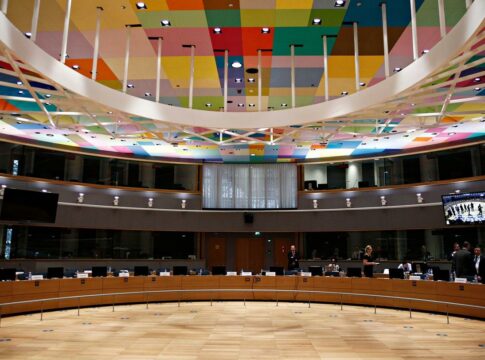Europe can shield itself against the effects of US President Donald Trump’s policies by unifying policies and institutions, Bank of Greece (BoG) Governor Yannis Stournaras said in an interview with “N”.
If we want to react dynamically against the US and China, we must unify the capital markets and the European banking sector and, gradually, lead to (some form of) fiscal union, the Greek central banker noted, without the political unification of the EU being a necessary condition.
On the possibility of tariffs being imposed by the US, Stournaras emphasized that Europe must, in principle, appoint a negotiator, adding that the ECB is working on various scenarios regarding the effects of this move.
Regarding the cost of (potential) tariffs, he estimated that it will slow down the Eurozone’s GDP by 0.5-1.0 percentage point over a two-year period while he did not rule out the possibility that the consequences of the tariffs will accelerate the ECB’s interest rate reduction.
Stournaras also sees interest rate cuts approaching 2% by the end of 2025, from 3%, while he characterized the spread between loan and deposit interest rates in Greece as high.
He also spoke of “profit inflation”, emphasizing that certain sectors of the economy have very high profit margins, while revealing that the cash in the Greek market has shrunk to 4 billion euros.
How worried are you about the course of Europe and the fact that the EU member states are between the US and China?
“First of all, in Europe we have already achieved what we call a ‘soft landing’. In October 2022, inflation soared to 10.6% in the Eurozone, while now it stands at 2.3%-2.4%. It is very likely that it will meet the 2% target no later than the third quarter of this year. As for growth in 2025, we expect a GDP growth rate of 1.1%. Consequently, the European Central Bank, with the help of other factors of course, has tamed inflation without causing a recession and without, also, creating financial stability problems in banks.”
How do you comment on President Trump’s announcements immediately after his inauguration speech?
“All the 2025 forecasts I mentioned before do not take into account the implementation of President Trump’s announcements. However, I believe that the new US administration will think twice before implementing these announcements. However, if tariffs are imposed on Europe and they are, for example, 10%, the impact on Europe’s economic growth will be about 0.5-1.0 percentage point over a two-year period (estimates vary). As for European inflation, it is not expected to be substantially affected by the tariffs, however, there will be more general stagflationary trends in the global economy. These results will worsen, both in terms of growth and inflation, if there is a corresponding response from those affected (retaliation).”
How concerned are you about the possibility of further negative effects on Europe from energy?
“One of the reasons that Europe was close to recession, alongside high inflation, was the pressures that the energy sector received during the period of the Russian-Ukrainian crisis. Europe, being a net importer of energy, unlike the US which is a net exporter, suffered stronger inflationary pressures in recent years, and stronger pressures on the rates of economic growth. Now energy prices have normalized to a large extent, however, there was and is an issue regarding the cost of energy, between North and South in Europe, as well as Central and Southern Europe.
“We may have made great progress in deploying renewable energy, but we have not made comparable progress in networks, market connectivity, or electricity storage, which perpetuates a ‘energy divide’ between North and South in Europe, as green energy is clearly cheaper in the European North than in the South. The European South is also suffering more from the effects of the Russian invasion of Ukraine. The fragmentation of Europe’s energy market remains a serious problem.”
Does Europe have the means or the capital to deal with the effects of a potential imposition of tariffs by Trump?
“The first thing that Europe must do is to appoint a negotiator (e.g. the European Commission) for this crucial issue. As the ECB, we are working on a series of scenarios regarding the impacts. However, the decision belongs to the European leaders, who should consider how Europe should react to the possibility – because we are still discussing the possibility – of imposing tariffs, and even more so the possibility that tariffs will differ from country to country.”
In Greece, what will be the impact?
“In Greece, we do not expect any particular impact, because the Greek economy is not largely exposed to exports to the US, but indirect consequences will arise. We have estimated that Greece will show growth of 2.5% this year, a performance that is directly related to a growth rate in the Eurozone of 1.1%. So if the rate in the Eurozone slows down, as I mentioned above, due to the imposition of tariffs, there will obviously be an impact on Greek GDP, but not a significant one.”
Is Greece in a good position provided that it does not rely on production, but on tourism and, therefore, will have limited impact from adverse international circumstances?
“Obviously, this is true. Besides, do not forget that during the pandemic crisis, Greece showed large losses in GDP precisely because it was exposed to tourism, while today, when the exact opposite is happening, the Greek economy is showing high rates of convergence with the rest of Europe.”
Are you concerned that Europe is also facing issues in the field of technology, as the US and China are developing technologically faster than the European economy?
“I would not say that Europe is lagging behind in technology. However, it is lagging behind in its productivity compared to the US, which began with the great financial crisis of 2009. Until then, the growth rates of European GDP and European productivity were comparable to those of the US. Since then, Europe has begun to head downwards, with investments losing momentum, showing a lag of around 5 percentage points of GDP compared to the United States.
This weakness is also highlighted by the Draghi Report, while a second vulnerability of Europe is that it has not proceeded with the desired integration of its capital markets, as well as the banking sector, naturally also refraining from fiscal union.
As an economy, it remains only a monetary union. If we want to react dynamically against the US and China, we must integrate the capital markets and the European banking sector and, gradually, lead ourselves to (some form of) fiscal union. At the same time, of course, we are also called upon to solve the issue of making investments so that European performance becomes comparable to that of the United States. While savings exist in Europe, investments are lagging behind.
But does all this presuppose political unification?
“Let’s be realistic. We remain far from this specific goal, but political unification is not a prerequisite for the unification of capital markets and the banking sector.”
ECB interest rates will be close to 2% at the end of 2025
What is your assessment of the course of interest rates?
“Considering that inflation in the Eurozone continues to decline, within our forecasts and perhaps even lower, and that its economy is perhaps weaker than we had predicted, even under the threat of the imposition of tariffs, we are called upon to proceed, gradually of course due to the great uncertainty, with interest rate cuts, which, in my personal assessment, should be about 25 bps each time, so that they are close to 2% by the end of 2025, from 3% today.”
How would a possible imposition of tariffs by the US affect the evolution of interest rates?
“It is most likely that it would accelerate the reduction in interest rates, since it would further negatively affect the evolution of the European economy’s figures.”
Focusing on the interest rate levels as recorded in Greece, what do you think the gap between lending and deposit rates should be?
“There is no specific rule. Greece has floating lending rates, so ECB interest rate cuts are immediately absorbed, however, the spread, which you are asking me about, depends on many factors and mainly on the liquidity of the banking system and its degree of concentration (I am not mentioning asset quality, because this has now improved significantly). For the Greek banking system, these two indicators are the most important ones.
The deposit-to-loan ratio shows a noticeable deviation from the European average, with Greek banks having particularly strong liquidity. The spread thus remains among the highest in Europe and our wish would be for it to converge, to a greater extent, towards the average level of the European market.
As a central bank, in cooperation with the government, we are contributing to intensifying competition in the domestic banking market, creating a fifth pole, with a group of smaller, strong banks that can compete with the four systemic ones. Of particular importance here is the merger of Attica Bank with Pancreta Bank and the significant capital increase that was carried out.
The bad loans have been transferred to servicers but continue to burden the real economy. Combined with the debts to the tax authorities and EFKA, which amount to 107 billion euros and 49 billion euros, respectively, we have a very high level of overdue private debt. Is there no need for a settlement?
“The majority of non-performing loans have been correctly written off from the banks’ balance sheets and have been transferred to servicers and funds. If, now, we add up the non-performing loans that remain in banks with those outside the banking system, they are still high, but they have decreased by more than 25 billion euros in total.
Regarding private debt, it is indeed high, around 220 billion euros, but it is much lower than the Eurozone average. However, we are striving to reduce it. Especially for the portfolio that concerns non-performing loan managers, we have tightened their supervision framework, while, at the same time, we are giving them the opportunity to provide loans to borrowers, so that they can, when the loans become performing again, return to the banking system, so as to help the credit expansion of the banks, but mainly to help the borrowers themselves.”
Greece will show more than double the growth rate of the Eurozone this year, 2.5% compared to 1.1%. However, how qualitative is it, as it is based on consumption, while investments are lagging behind and most of it concerns acquisitions of existing businesses or real estate purchases?
“In the first nine months of 2024, the 2.4% growth was due in equal measure to consumption and investment. Therefore, investment is also increasing as a percentage of GDP. From 24% before the crisis, it fell below 10% during that period and it is close to 16%.”
The reforms obviously support the government’s intention to change the country’s production model. But why is it not changing to the extent required?
“Changing the production model is not something that happens overnight. First of all, exports amounted to 20% of GDP before the crisis, of which 10% were goods and 10% were services. Now we have reached approximately 45% of GDP, with the participation of goods and services remaining divided. The problem lies in the lack of import substitution. Because while investments are pushing the domestic economy faster than the rest of Europe, we do not have the necessary intermediate goods to fuel production, so we import them. This is where the question of changing the industrial model arises.”
Wages to “follow” productivity
What do we need to change to attract productive foreign direct investment?
“The number one problem in attracting foreign investment is bureaucracy. A lot has been done in the institutional framework, such as improving price and wage competitiveness, but we still need to cut down on bureaucracy, accelerate the licensing process, increase the speed of justice, as well as licensing times, but also to upgrade the education system that produces the skills that the market wants.”
Today, in Greece, collective labor agreements are extremely limited and the level of wages is very low, resulting in young people leaving the country and job vacancies not being filled…
“In recent years, wages have increased significantly, while the trend of brain drain has been reversed. The minimum wage has increased by about 50% and the average wage by about 25% over the last six years. In general, increases in average earnings have covered the pressure of inflation. In any case, however, we must measure wages in relation to productivity, which in Greece is very low compared to the European average, and accordingly wages are relatively low compared to the European average. If wages increase much more than productivity can support, this will lead to unemployment, an even larger deficit in the current account balance and we will essentially lose everything we have achieved so far. We must be very careful, as one of the two main reasons that led us to the economic crisis was precisely the large increase in wages in relation to productivity. The other reason, even more basic, was fiscal diversion.
Collective labor agreements are a guarantee for employees, but why are only 10% of them covered accordingly?
“Gradually, an increasing percentage is covered by collective agreements. Already, several sectors have granted high increases. However, everything must be done in moderation, so that we do not return to the causes that led us to the crisis.”
Which markets present high profit margins?
“We are seeing phenomena of high concentration in banks, private hospitals, and energy. Also, as you know, we conducted and published a special study on prices in supermarkets. The phenomena of high concentration are not new, and are partly explained by the relatively small size of the Greek economy.”
Let us move on to other issues, such as the issue of tax evasion and the use of cash.
“The use of electronic money has significantly reduced tax evasion. We must support digital transactions, because the basis for the positive course of the economy is the fiscal issues, and we have insisted on these, both the government and the Bank of Greece. Let us not forget that the consolidation of the fiscal issues brought the country out of the crisis. We must pay attention to them as the apple of our eye and one of the reasons for their positive course is the noticeable reduction in tax evasion.”
How much cash do we use in our transactions today?
“The use of cash in the economy has been limited to 4 billion euros. When we joined the euro, 22 years ago, it was 5 billion euros. During the crisis, it had reached approximately 50 billion euros and now it has been limited to 4 billion. This is a sign of confidence, but also the way to reduce tax evasion.”
What is the level of the shadow economy and tax evasion in Greece today?
“Although the shadow economy is recorded as one of the highest in Europe, it has been significantly reduced in recent years, due to the spread of electronic transactions and the corresponding restriction on the use of cash. Existing studies record a difference between 15% and 20% of GDP. This, I emphasize, is an estimate of the shadow economy and not tax evasion.”
What other measures could be taken to combat tax evasion?
“I think that the digitization of transactions is one of the most basic measures. Beyond that, the Independent Authority for Public Revenue (AADE) has done an excellent job, by connecting POS to cash registers. By the way, the creation of the AADE was, in my opinion, one of the most important reforms that took place during the crisis. Another, very important, but largely unknown to the general public, reform was the creation of a treasury between the Public Debt Management Agency (PDMA) and the Bank of Greece.”
Would you see the abolition of cash, in order to effectively tackle tax evasion?
“There is no issue of abolishing cash. It will probably be reduced further, but I don’t see a complete abolition.”
Are we prepared to manage the public debt in view of the arrival of 2032, when the grace period ends?
“The impacts have now been taken into account and have been recorded. We do not expect any unpleasant surprises in 2032. However, we must continue with primary surpluses of 2% of GDP, cyclically adjusted, and in order to achieve this on a permanent basis, we are called upon to continue the responsible management of public finances, as well as to intensify reform efforts to ensure a high annual rate of economic growth. That is, to keep under control, on a permanent basis, both the numerator, i.e. the primary fiscal surplus, and the denominator, i.e. increasing GDP.”
Will the Bank of Greece pay a dividend this year?
“Let’s wait and see our results first. The Bank of Greece is one of the few banks in the Eurosystem that generated profits and paid a dividend during the period of interest rate increases.”














